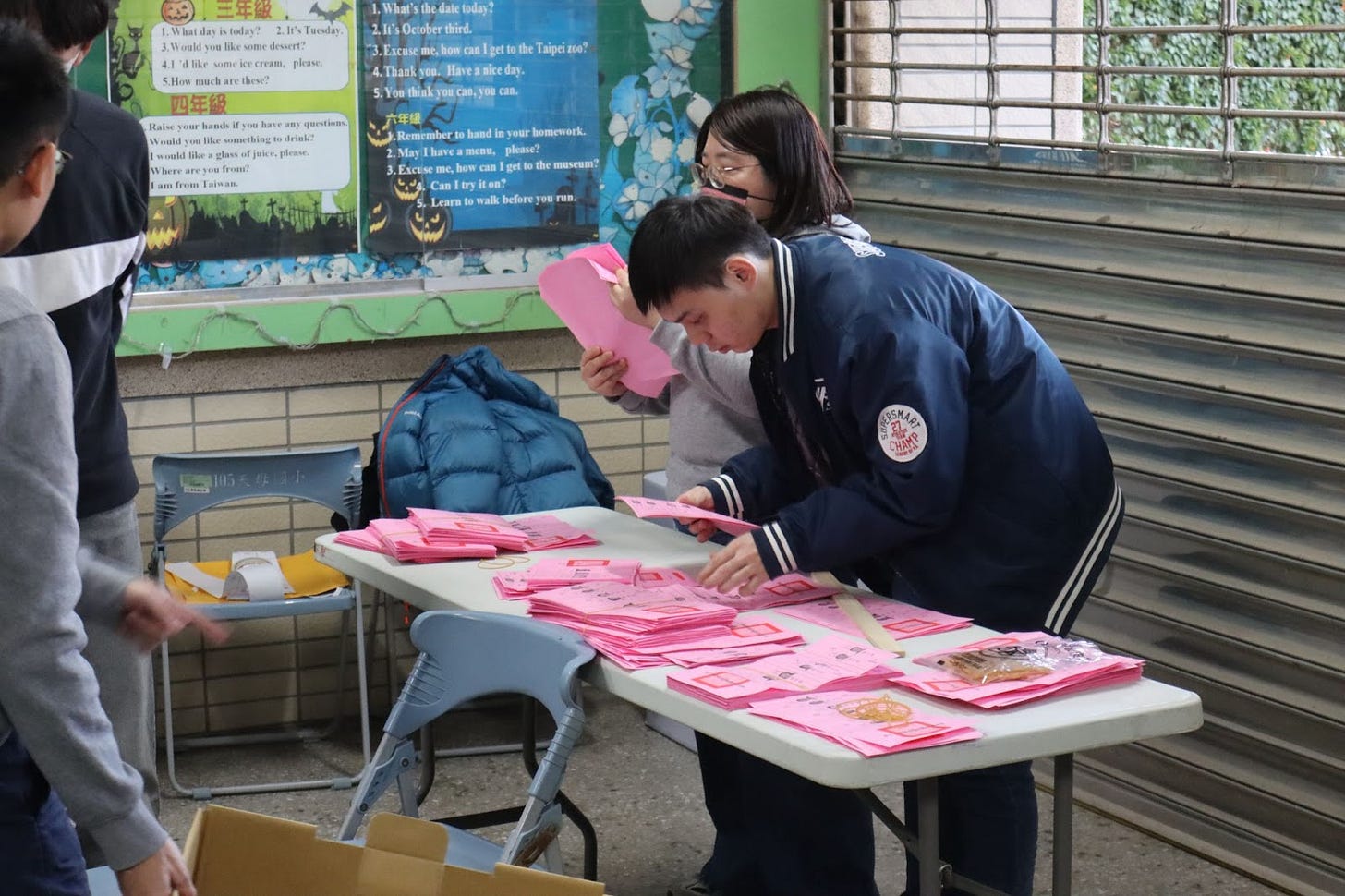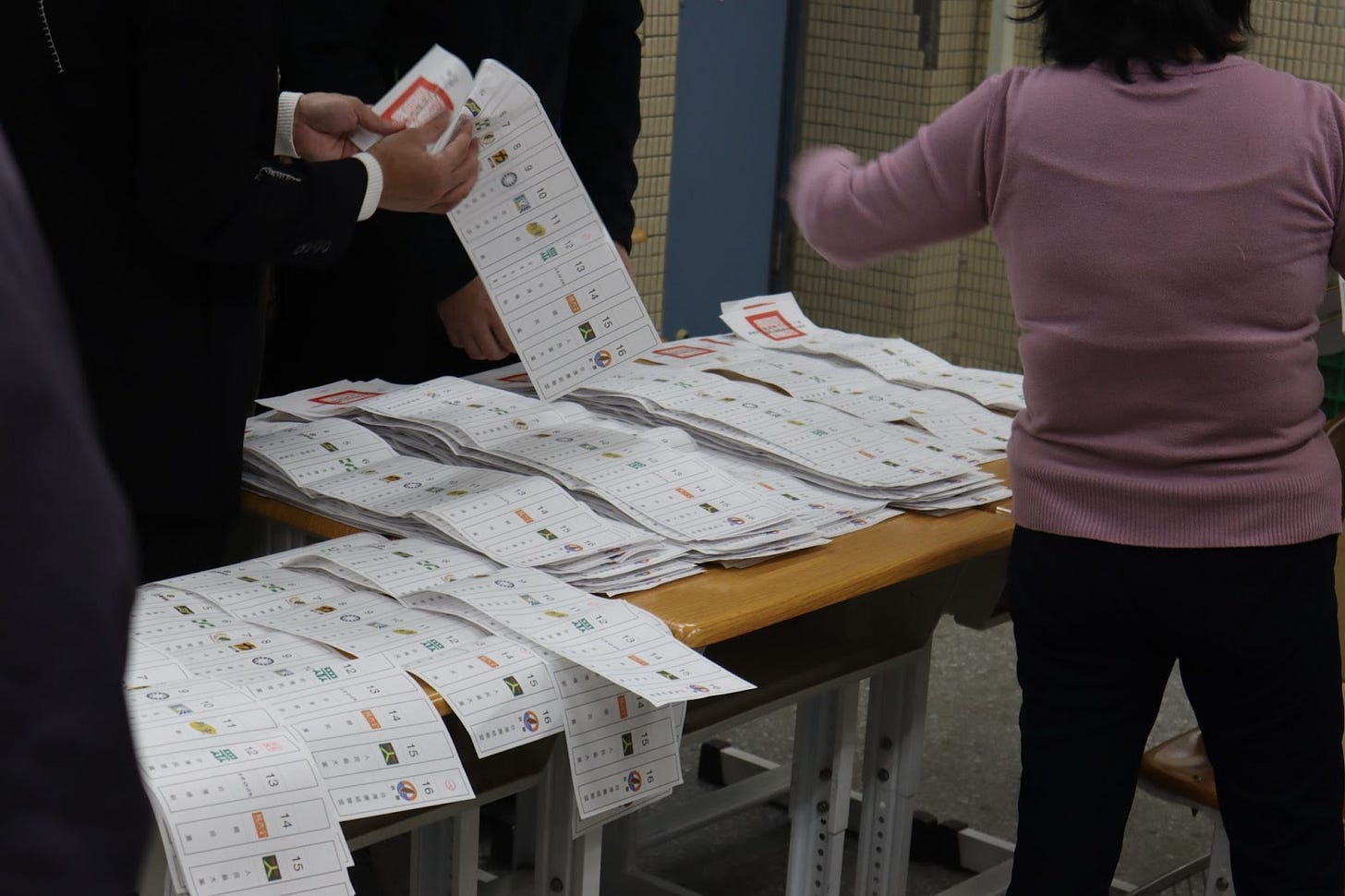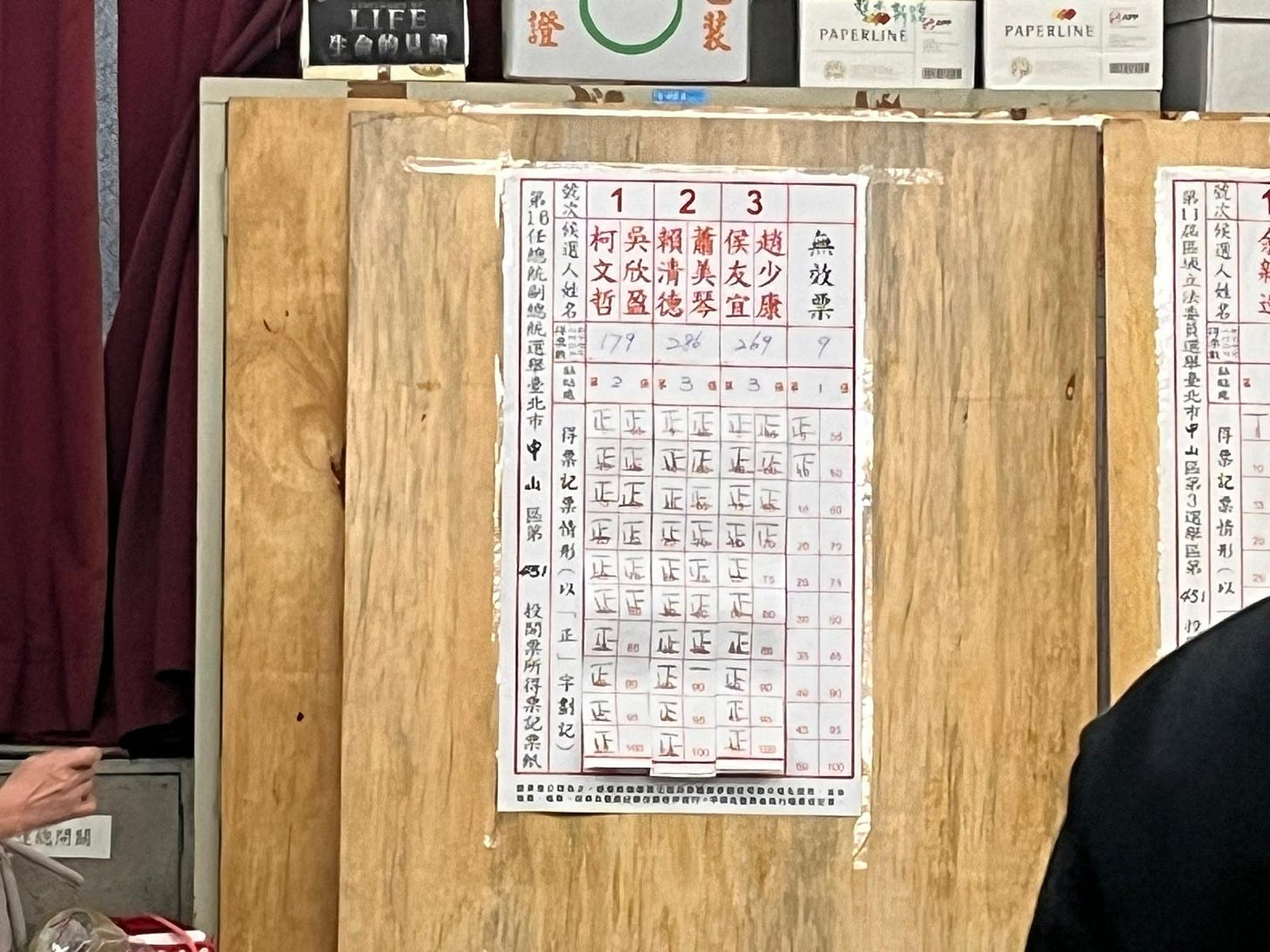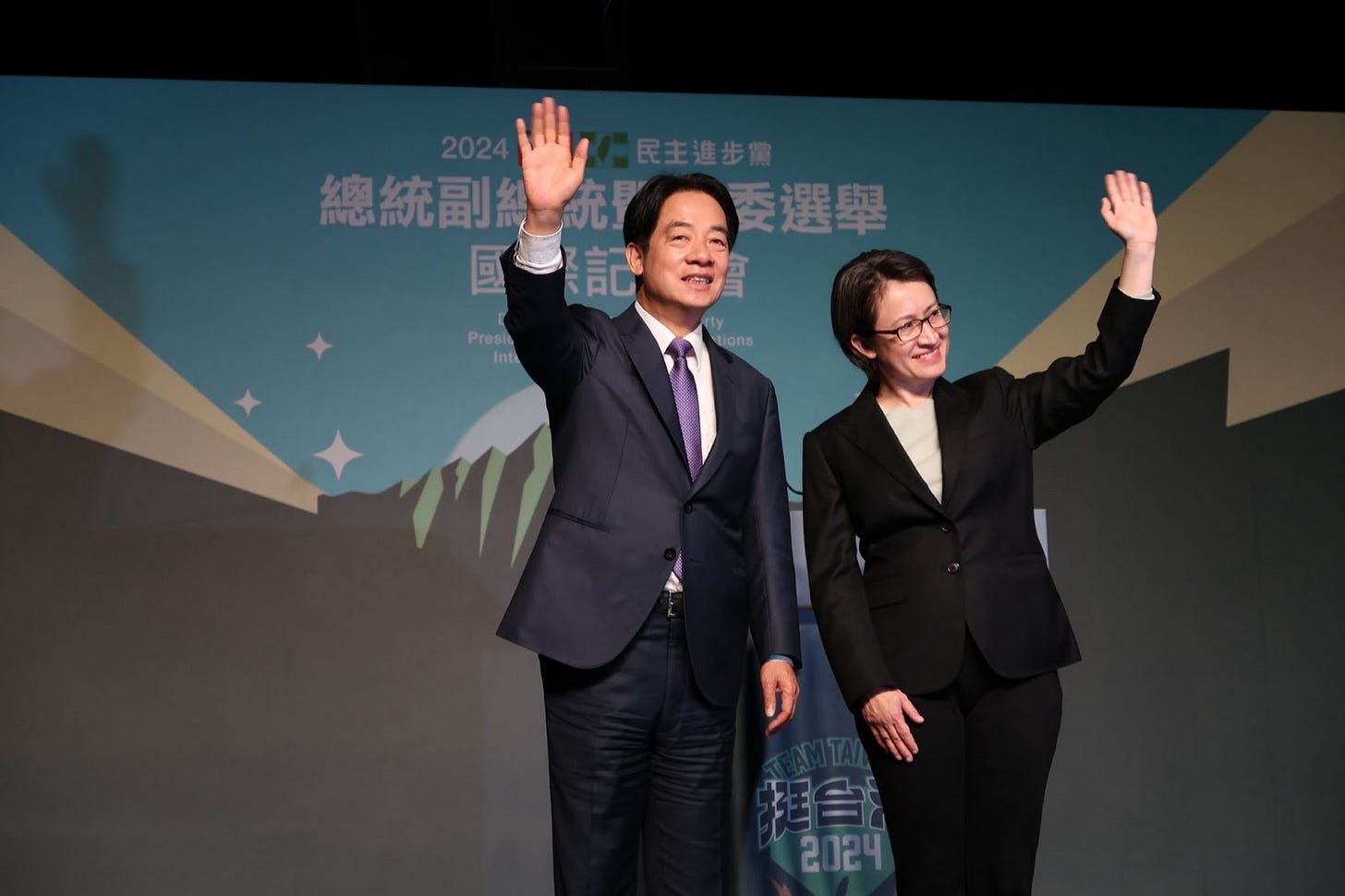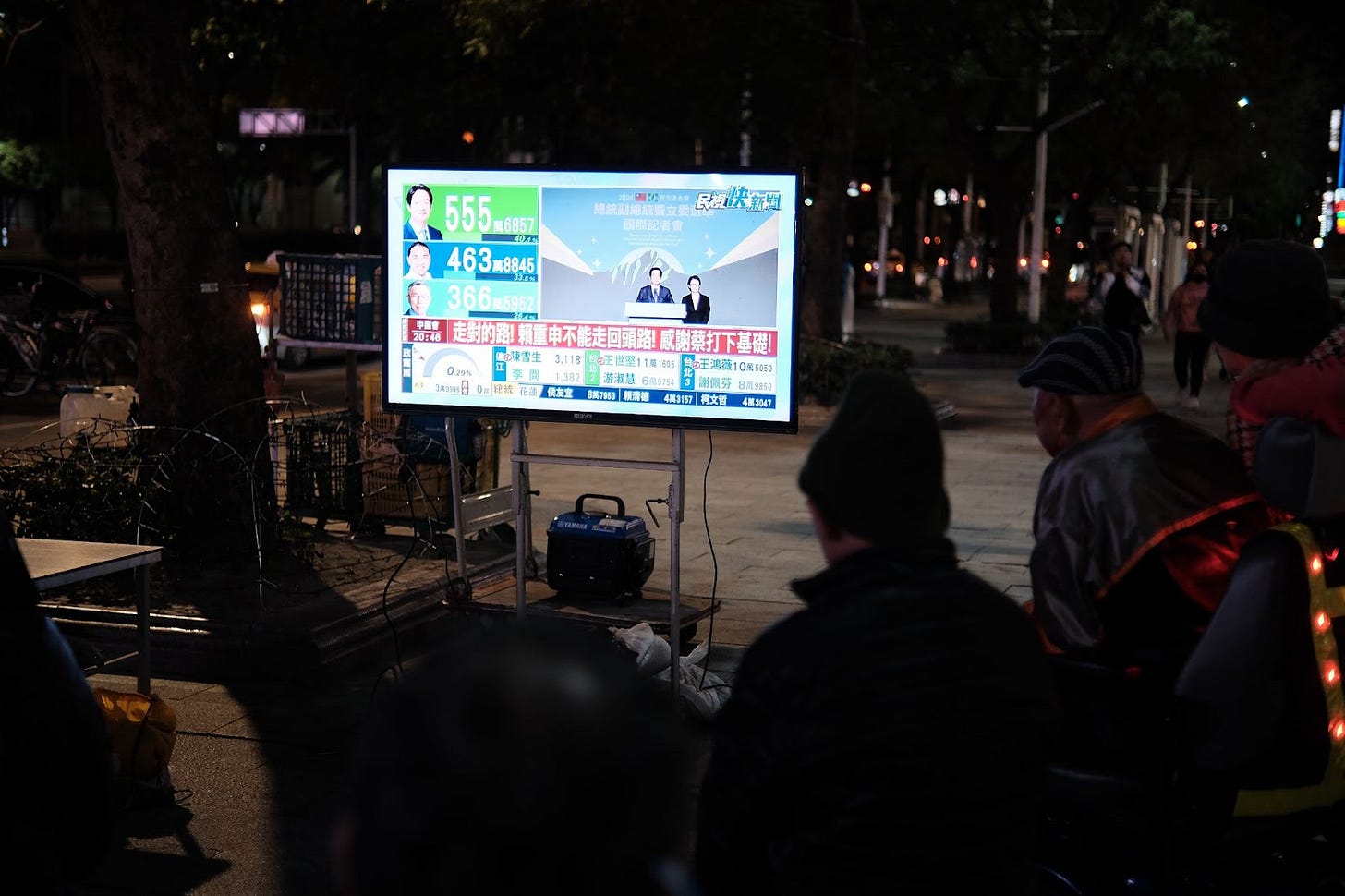Taiwan Election: January 13
Day 7:The general election in Taiwan has drawn to a close, heralding a significant transformation in the political sphere from a two-party to a tripartite system. 同學們關於台灣大選的最後一天報導:勝者和落敗者
DPP's Lai Ching-te Elected President in Historic Victory; KMT Largest Party in Legislative Shakeup
By Kong Tsz Yuen, Miu Wai Yan, Mao Anqi
Video: Tsai Ing-wen arrives at a polling station to cast her vote
Video: Hsiao Bi-khim, the vice president candidate of DDP, arrives at a polling station
Taipei, January 13 (TYR) - The results of the 2024 general election have been announced, with Democratic Progressive Party (DPP) candidates Lai Ching-te and Hsiao Bi-khim winning with 5.58 million votes to become the 16th President and Vice President, respectively. Lai Ching-te not only becomes the first person in Taiwan's history to transition from Vice President to President through an election but also, as the party chair, leads the DPP in governing beyond eight consecutive years, entering into a third term of four years.
Video: Vote counting at Taipei National Zhongshan Elementry School
The DPP lost ten seats in the regional legislature elections in the Legislative Yuan. At the same time, the Kuomintang (KMT) reclaimed its status as the largest party in the parliament, securing 52 seats, including at-large seats. Despite not winning any regional legislator seats, Ko Wen-je's Taiwan People's Party saw their party vote percentage double to 22%, earning them eight at-large legislator seats, solidifying their position as a key minority and third force in politics. Other minor parties, such as the New Power Party, suffered complete defeats, with none gaining more than 3% of the votes.
Video: Jaw Shaw-kong, KMT Vice Presidential Candidate, Accompanied by Taipei Mayor Chiang Wan-an, Casts His Vote
Data from Taiwan's Central Election Commission shows that there were approximately 19.5 million eligible voters for this election, with around 14 million valid votes cast, resulting in a high voter turnout rate of 71.86%.
Video: Taiwan People's Party vice-presidential candidate Wu Hsin-Ying goes to vote.
Lai Ching-te Triumphs in Taiwan Election; Vows to Maintain Peace in Taiwan Strait and Uphold Democratic Values
By YANG Haichen, Bo Chuxuan, YANG Shuyi
Taipei, January 12 (TYR) - On the evening of January 13, Democratic Progressive Party (DPP) presidential candidate Lai Ching-te and his running mate Hsiao Bi-khim won the general election. At 8:36 PM, they held an international press conference to deliver their victory speeches and address relations across the Taiwan Strait.
Lai stated that the victory sends a message to the world that the people of Taiwan have chosen to stand on the side of democracy in the dichotomy between democracy and authoritarianism.
He further emphasized that Taiwan will continue to work hand in hand with its international allies in the pursuit of democracy.
Addressing the Taiwan Strait issue with caution at the rally, Lai said that maintaining peace and stability in the Taiwan Strait is an essential responsibility.
“I will act by our democratic and free constitutional order in a balanced way that maintains the status quo across the Strait. Under dignity and parity, we intend to replace obstruction with exchanges and confrontation with dialogue, confidently pursuing exchanges and cooperation with China. This approach promotes the well-being of people on both sides of the Taiwan Strait and aims to achieve our goals of peace and shared prosperity. At the same time, we are resolved to protect Taiwan from ongoing threats and intimidation from China."
In response to a reporter's question about "restarting dialogue with Beijing," Lai urged Beijing to "recognize that peace is a crucial element for both sides of the Taiwan Strait and that China also has a responsibility to promote co-development across the strait."
Lai also expressed his intent to continue the cross-strait policies of the Tsai Ing-wen administration, describing them as "sound" and "internationally recognized."
Faced with potential unrest, Lai affirmed, "I am determined to ensure Taiwan's security."
Addressing the DPP's inability to secure a majority in the legislature, Lai Ching-te candidly admitted their efforts fell short. He acknowledged that the people expect an efficient government and a strong system of checks and balances, and he assured them that they would humbly accept this verdict. In light of the new parliamentary structure, he stated that Taiwan must move towards a political form emphasizing communication and cooperation. He also plans to consider the policy positions of the two candidates and, in future personnel arrangements, will uphold the spirit of a broad democratic alliance. This approach will be non-partisan and merit-based, and he welcomes recommendations from professionals from all sectors.
Lai Ching-te emphasized that issues with cross-party consensus will be prioritized in future governance. For those matters where consensus is lacking or not urgent, efforts will be made to set aside disputes and continue communication.
Taiwanese Election Stirs Emotion as Candidates Address Voters Post-Defeat
By Siena Chen, Nicole Chu, Tom Shuai
Taipei, January 13 (TYR) - Hou Yu-ih, the presidential candidate of Kuomintang (KMT), made an appearance around 8 p.m., bowing several times to his supporters and expressing "120,000 apologies" for "not enough effort."
Regarding the presidential election results, Hou Yu-ih stated, "I have personally exerted full effort and am very regretful that I could not change power, disappointing everyone. I wish to extend my deepest apologies to everyone."
After the disintegration of the "Blue-White Coalition," the KMT was still unable to persuade supporters of Ko Wen-je to "abandon their votes to save the party" at the last minute. Instead, Ko Wen-je successfully rallied the night before the election, creating an event that drew 600,000 online and offline participants, ultimately leading to an "anti-vote abandonment" effect. Both the Blue and White camps secured a substantial number of votes, and the staunch support for their respective leaders resulted in the DPP's Lai Ching-te maintaining a lead throughout the election.
Edward Wang, 60, another KMT supporter, mentioned he had predicted the KMT's loss in this presidential election since the partnership between the KMT and TPP failed.
"The TPP would split too many votes," Wang remarked.
“Fortunately, the KMT holds a narrow majority of one seat over the DPP in the Legislative Yuan. As the largest party in the Legislative Yuan, it can somewhat balance the power of the DPP," Wang added.
Tony Lin, a 65-year-old taxi driver and KMT supporter, said they have trouble getting passengers except on weekends. He attributed this to the DPP's administration, claiming that Taiwan's economy is depressed, leading people to save rather than spend money.
"Moreover, the DPP does not disclose its financial budget, which is my biggest concern regarding the corruption within the DPP," Lin stated.
At 8 p.m., Ko Wen-je, the Taiwan People's Party (TPP) presidential candidate, appeared at his campaign headquarters in Xinzhuang, New Taipei City. He took the stage to concede defeat, along with his vice-presidential candidate Wu Hsin-ying, his staff, and all non-district legislative candidates.
Ko Wen-je said he always treated this election as a "civic movement." "In the pursuit of justice and the sustainability of the nation, I will not give up, and I ask everyone not to give up," he declared. Some of his supporters below the stage were tearfully moved as he spoke these words.
Ko Wen-je first thanked his supporters, the campaign team, and those grassroots supporters who courageously stepped forward. "Under the pressure of both the Blue and Green camps, so many were willing to stand tall and help, facing the high walls of Blue and Green without ever giving up, persisting until this moment," he said. He noted that from his supporters, he saw how the people love Taiwan, proving to the world that Taiwan is not just about Blue or Green.
Morimori Zou, a 50-year-old supporter from Japan to Taiwan to support Ko Wen-je, expressed surprise at the election outcome.
"The result is beyond my expectations," Zou stated. "I believed Ko would win more votes than Tsai Ing-wen secured in 2020."
"The failure is not Ko's fault but a problem for the Taiwanese," Zou added.
Zou is not the only one who found the result unexpected. Tien Hao-lun, a 25-year-old supporter, thought Ko would lose when the TPP withdrew from cooperation with the KMT.
"However, the presidential debate and last night's rally at Ketagalan Boulevard made me feel that Ko had a chance of being elected," Tien said.
Tien began to worry about the outcome when Ko was 200,000 votes behind Lai Ching-te.
"I'm afraid the relationship between Taiwan and Mainland China will deteriorate after Lai becomes president," Tien expressed, "I will continue supporting TPP because I believe Ko is genuine, not a hypocritical politician."
Sky Bai, also 25, echoed Tien's sentiments.
"The DPP's extension of military service wastes a young man's working years. During my military service, I didn't receive any useful training as a reservist," he claimed.
"If there is a future war, Taiwan might as well surrender directly," Bai concluded.
Taiwan Stock Exchange Has No Plan for Virtual Currency ETF
By Junzhe Jiang
Taipei, January 12 (TYR) - The Taiwan Stock Exchange (TWSE) has no current plans to introduce virtual currency exchange-traded funds (ETFs), citing the lack of comprehensive regulation surrounding virtual currencies. This stance comes despite the U.S. Securities and Exchange Commission's (SEC) recent approval of the first spot Bitcoin ETFs.
In a landmark event, the TWSE's weighted index surpassed the Hang Seng Index in absolute index level for the first time in 31 years as of November 2023.
"Although we are actively promoting ETF-related products, comprehensive government regulations on virtual currency are necessary," commented Yang Shin-Yin, Senior Associate of the Corporate Planning and Strategy Department at TWSE.
The U.S. SEC permitted the launch of 11 spot Bitcoin ETF products on Wednesday. Following the announcement, Bitcoin's price climbed approximately 3% to about US$47,000 (around HK$347,474.6), closing at US$46,354.79 (approximately HK$362,577.9).
Over the past decade, Taiwan's ETF assets have grown by 12.83 times and increased about 60.47% in the previous year, ranking it among Asia's top three ETF markets, as reported by the Taiwan Stock Exchange's website.
The Taiwan Stock Exchange is headquartered in the iconic Taipei 101 building, a key landmark in Taiwan.
Globally, including in Taiwan, crypto assets such as Bitcoin are not recognized as legal tender. The U.S. SEC underscored that their approval of Bitcoin ETFs should not be viewed as endorsing Bitcoin itself. "While we approved the listing and trading of certain spot Bitcoin ETP shares today," the U.S. SEC clarified in a statement, "this is not an approval or endorsement of Bitcoin. Investors are urged to exercise caution due to the numerous risks associated with Bitcoin and any products linked to cryptocurrencies.”



